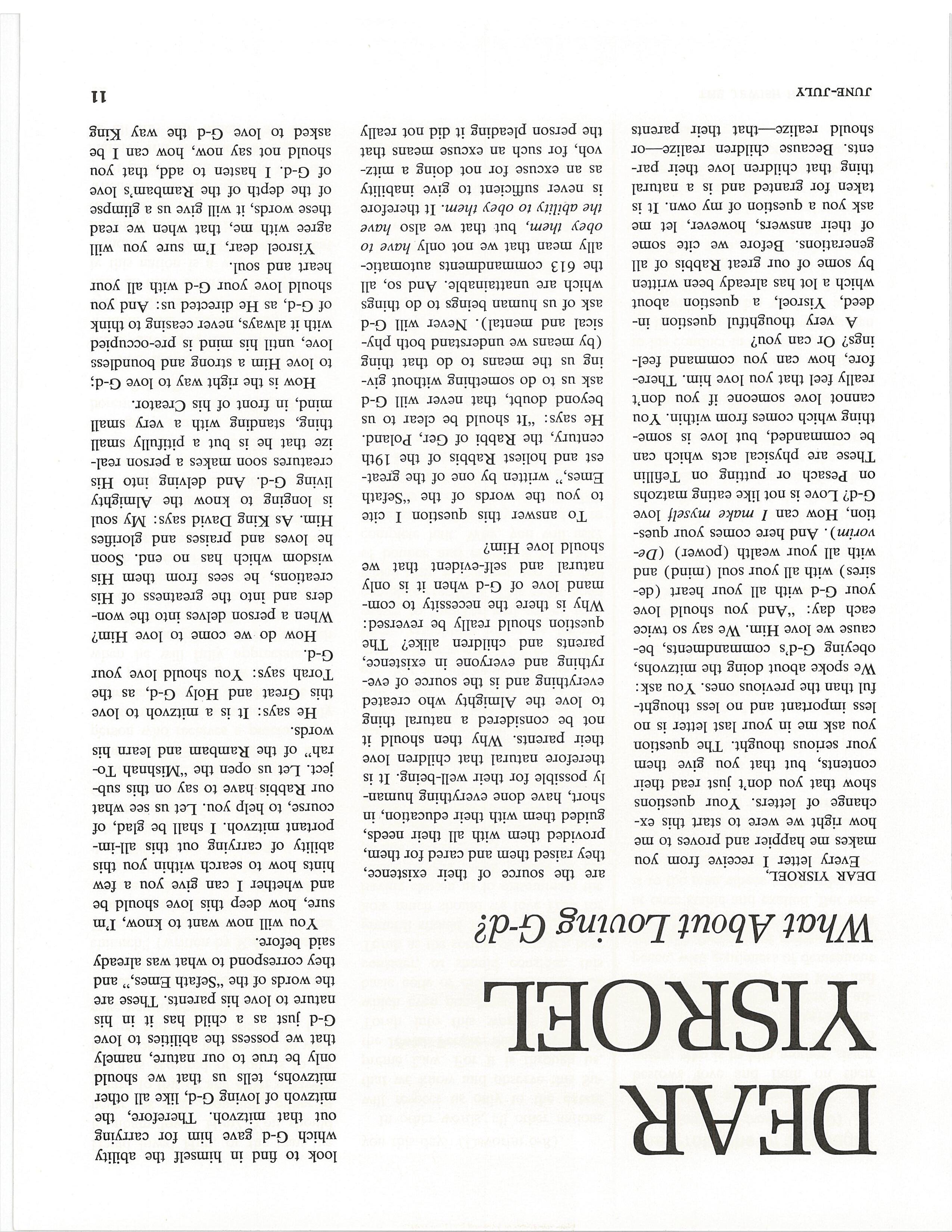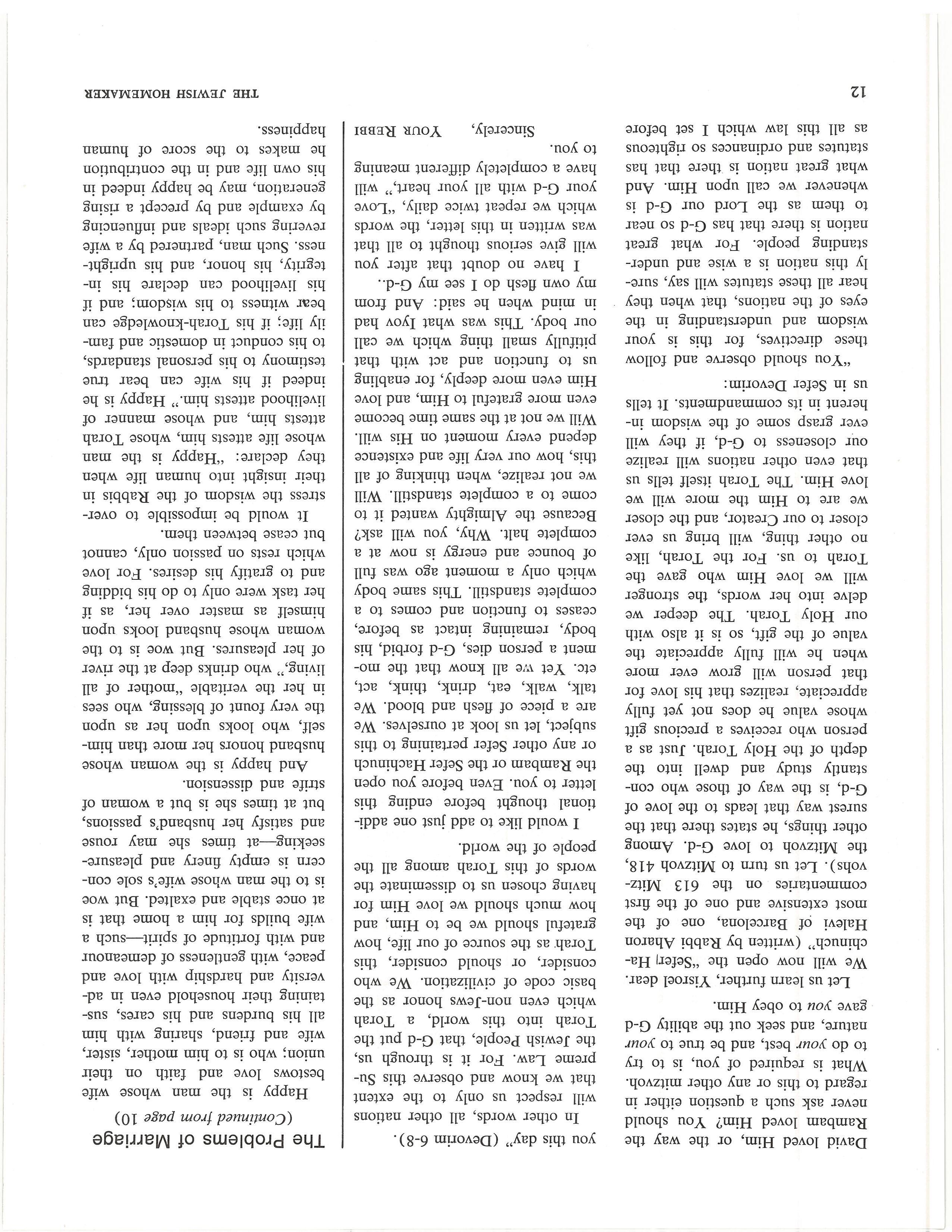
7 minute read
DEAR YISROEL WhatAboutLoving G-d?
DEAR YISROEL,
Every letter I receive from you makes me happier and proves to me how right we were to start this ex change of letters. Your questions show that you don’t just read their contents, but that you give them your serious thought. The question you ask me in your last letter is no less important and no less thought ful than the previous ones. You ask: We spoke about doing the mitzvohs, obeying G-d’s commandments, be cause we love Him. We say so twice each day: “And you should love your G-d with all your heart (de sires) with all your soul (mind) and with all your wealth (power) (De vorim). And here comes your ques tion, How can I make myself love G-d? Love is not like eating matzohs on Pesach or putting on Tefiuin These are physical acts which can be commanded, but love is some thing which comes from within. You cannot love someone if you don’t really feel that you love him. There fore, how can you command feel ings? Or can you?
Advertisement
A very thoughtful question in deed, Yisroel, a question about which a lot has already been written by some of our great Rabbis of all generations. Before we cite some of their answers, however, let me ask you a question of my own. It is taken for granted and is a natural thing that children love their par ents. Because children realize—or should realize—that their parents are the source of their existence, they raised them and cared for them, provided them with all their needs, guided them with their education, in short, have done everything human ly possible for their well-being. It is therefore natural that children love their parents. Why then should it not be considered a natural thing to love the Almighty who created everything and is the source of eve rything and everyone in existence, parents and children alike? The question should really be reversed: Why is there the necessity to com mand love of G-d when it is only natural and self-evident that we should love Him?
To answer this question I cite to you the words of the “Sefath Emes,” written by one of the great est and holiest Rabbis of the 19th century, the Rabbi of Ger, Poland. He says: “It should be clear to us beyond doubt, that never will G-d ask us to do something without giv ing us the means to do that thing (by means we understand both phy sical and mental). Never will G-d ask of us human beings to do things which are unattainable. And so, all the 613 commandments automatic ally mean that we not only have to obey them, but that we also have the ability to obey them. It therefore is never sufficient to give inability as an excuse for not doing a mitz voh, for such an excuse means that the person pleading it did not really look to find in himself the ability which G-d gave him for carrying out that mitzvoh. Therefore, the mitzvoh of loving G-d, like all other mitzvohs, tells us that we should only be true to our nature, namely that we possess the abilities to love G-d just as a child has it in his nature to love his parents. These are the words of the “Sefath Emes,” and they correspond to what was already said before.
You will now want to know, I’m sure, how deep this love should be and whether I can give you a few hints how to search within you this ability of carrying out this all-im portant mitzvoh. I shall be glad, of course, to help you. Let us see what our Rabbis have to say on this sub ject. Let us open the “Mishnah To rah” of the Rambam and learn his words.
He says: It is a mitzvoh to love this Great and Holy G-d, as the Torah says: You should love your G-d.
How do we come to love Him? When a person delves into the won ders and into the greatness of His creations, he sees from them His wisdom which has no end. Soon he loves and praises and glorifies Him. As King David says: My soul is longing to know the Almighty living G-d. And delving into His creatures soon makes a person real ize that he is but a pitifully small thing, standing with a very small mind, in front of his Creator.
How is the right way to love G-d; to love Him a strong and boundless love, until his mind is pre-occupied with it always, never ceasing to think of G-d, as He directed us: And you should love your G-d with all your heart and soul.
Yisroel dear, I’m sure you will agree with me, that when we read these words, it will give us a glimpse of the depth of the Rambam’s love of G-d. I hasten to add, that you should not say now, how can I be asked to love G-d the way King
David loved Him, or the way the Rambam loved Him? You should never ask such a question either in regard to this or any other mitzvoh. What is required of you, is to try to do your best, and be true to your nature, and seek out the ability G-d gave you to obey Him.
Let us learn further, Yisroel dear. We will now open the “Seferi Ha chinuch” (written by Rabbi Aharon Halevi of Barcelona, one of the most extensive and one of the first commentaries on the 613 Mitz vohs). Let us turn to Mitzvoh 418, the Mitzvoh to love G-d. Among other things, he states there that the surest way that leads to the love of G-d, is the way of those who con stantly study and dwell into the depth of the Holy Torah. Just as a person who receives a precious gift whose value he does not yet fully appreciate, realizes that his love for that person will grow ever more when he will fully appreciate the value of the gift, so is it also with our Holy Torah. The deeper we delve into her words, the stronger will we love Him who gave the Torah to us. For the Torah, like no other thing, will bring us ever closer to our Creator, and the closer we are to Him the more will we love Him. The Torah itself tells us that even other nations will realize our closeness to G-d, if they will ever grasp some of the wisdom in herent in its commandments. It tells us in Sefer Devorim:
“You should observe and follow these directives, for this is your wisdom and understanding in the eyes of the nations, that when they hear all these statutes will say, sure ly this nation is a wise and under standing people. For what great nation is there that has G-d so near to them as the Lord our G-d is whenever we call upon Him. And what great nation is there that has statutes and ordinances so righteous as all this law which I set before you this day” (Devorim 6-8).
In other words, all other nations will respect us only to the extent that we know and observe this Su preme Law. For it is through us, the Jewish People, that G-d put the Torah into this world, a Torah which even non-Jews honor as the basic code of civilization. We who consider, or should consider, this Torah as the source of our life, how grateful should we be to Him, and how much should we love Him for having chosen us to disseminate the words of this Torah among all the people of the world.
I would like to add just one addi tional thought before ending this letter to you. Even before you open the Rambam or the Sefer Hachinuch or any other Sefer pertaining to this subject, let us look at ourselves. We are a piece of flesh and blood. We talk, walk, eat, drink, think, act, etc. Yet we all know that the mo ment a person dies, G-d forbid, his body, remaining intact as before, ceases to function and comes to a complete standstill. This same body which only a moment ago was full of bounce and energy is now at a complete halt. Why, you will ask? Because the Almighty wanted it to come to a complete standstill. Will we not realize, when thinking of all this, how our very life and existence depend every moment on His will. Will we not at the same time become even more grateful to Him, and love Him even more deeply, for enabling us to function and act with that pitifully small thing which we call our body. This was what Iyov had in mind when he said: And from my own flesh do I see my G-d..

I have no doubt that after you will give serious thought to all that was written in this letter, the words which we repeat twice daily, “Love your G-d with all your heart,” will have a completely different meaning to you.
Sincerely, YOUR REBBI
The Problems of Marriage
(Continued from page 10)
Happy is the man whose wife bestows love and faith on their union; who is to him mother, sister, wife and friend, sharing with him all his burdens and his cares, sus taining their household even in ad versity and hardship with love and peace, with gentleness of demeanour and with fortitude of spirit—such a wife builds for him a home that is at once stable and exalted. But woe is to the man whose wife’s sole con cern is empty finery and pleasureseeking—at times she may rouse and satisfy her husband’s passions, but at times she is but a woman of strife and dissension.
And happy is the woman whose husband honors her more than him self, who looks upon her as upon the very fount of blessing, who sees in her the veritable “mother of all living,” who drinks deep at the river of her pleasures. But woe is to the woman whose husband looks upon himself as master over her, as if her task were only to do his bidding and to gratify his desires. For love which rests on passion only, cannot but cease between them.
It would be impossible to overstress the wisdom of the Rabbis in their insight into human life when they declare: “Happy is the man whose life attests him, whose Torah attests him, and whose manner of livelihood attests him.” Happy is he indeed if his wife can bear true testimony to his personal standards, to his conduct in domestic and fam ily life; if his Torah-knowledge can bear witness to his wisdom; and if his livelihood can declare his in tegrity, his honor, and his upright ness. Such man, partnered by a wife revering such ideals and influencing by example and by precept a rising generation, may be happy indeed in his own life and in the contribution he makes to the score of human happiness.







